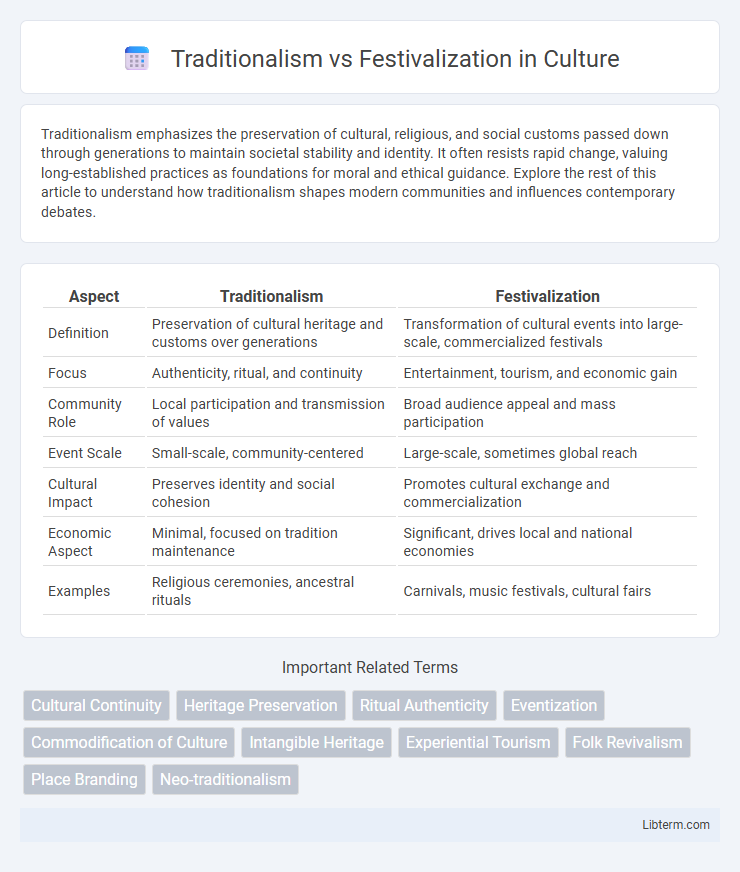Traditionalism emphasizes the preservation of cultural, religious, and social customs passed down through generations to maintain societal stability and identity. It often resists rapid change, valuing long-established practices as foundations for moral and ethical guidance. Explore the rest of this article to understand how traditionalism shapes modern communities and influences contemporary debates.
Table of Comparison
| Aspect | Traditionalism | Festivalization |
|---|---|---|
| Definition | Preservation of cultural heritage and customs over generations | Transformation of cultural events into large-scale, commercialized festivals |
| Focus | Authenticity, ritual, and continuity | Entertainment, tourism, and economic gain |
| Community Role | Local participation and transmission of values | Broad audience appeal and mass participation |
| Event Scale | Small-scale, community-centered | Large-scale, sometimes global reach |
| Cultural Impact | Preserves identity and social cohesion | Promotes cultural exchange and commercialization |
| Economic Aspect | Minimal, focused on tradition maintenance | Significant, drives local and national economies |
| Examples | Religious ceremonies, ancestral rituals | Carnivals, music festivals, cultural fairs |
Defining Traditionalism and Festivalization
Traditionalism emphasizes the preservation and continuation of cultural customs, rituals, and practices passed down through generations, embodying historical authenticity and social identity. Festivalization refers to the process of transforming cultural events into large-scale, often commercialized festivals aimed at mass participation and entertainment, prioritizing spectacle and tourism appeal. Defining traditionalism involves a focus on deep-rooted values and practices, while festivalization centers on accessibility, economic impact, and the creation of vibrant public experiences.
Historical Roots of Traditional Practices
Traditionalism in cultural practices is deeply rooted in the preservation of historical customs and rituals passed down through generations, often reflecting the values and beliefs of ancestral communities. Festivalization, by contrast, transforms these practices into organized, often commercialized public events that emphasize entertainment and tourism appeal over historical authenticity. The shift from traditionalism to festivalization highlights a tension between maintaining cultural heritage and adapting to contemporary social and economic pressures.
Emergence of Festival Culture
The emergence of festival culture marks a significant shift from traditionalism, emphasizing dynamic, large-scale events that prioritize creativity, community engagement, and entertainment value. Festivalization fosters vibrant, diverse experiences by integrating contemporary art, music, and technology, contrasting with traditional celebrations rooted in ritual and heritage. This evolution reflects modern societies' desire for inclusive, immersive environments that transcend conventional cultural boundaries.
Cultural Identity and Community Bonds
Traditionalism anchors cultural identity by preserving long-standing rituals, languages, and customs that foster a strong sense of continuity and belonging within communities. Festivalization, characterized by the commercialization and periodic celebration of culture, can both enhance visibility and risk diluting authentic communal bonds by prioritizing entertainment over heritage. The tension between maintaining cultural integrity and embracing festive innovation shapes how communities negotiate identity and social cohesion in a rapidly globalizing world.
Impact on Local Economies
Traditionalism preserves local economies by maintaining authentic crafts, food production, and heritage tourism, which foster sustainable income and community resilience. Festivalization often drives short-term economic boosts through increased visitor spending, accommodation demand, and cultural events, yet risks commodifying traditions and creating seasonal dependency. Balancing these approaches can optimize cultural preservation while maximizing economic benefits for local populations.
Preservation vs. Commercialization
Traditionalism prioritizes the preservation of cultural heritage by maintaining authentic rituals, practices, and community participation without altering their original meanings. Festivalization often leads to commercialization, transforming traditions into entertainment spectacles driven by tourism revenue and market demands. This shift risks diluting symbolic values, commodifying cultural expressions, and undermining the integrity of heritage preservation efforts.
Role of Media and Technology
Media and technology play contrasting roles in traditionalism and festivalization by shaping cultural expression and community engagement. Traditionalism relies on media to preserve and transmit heritage through documentaries, archival content, and educational programs, maintaining authenticity and historical continuity. Festivalization leverages digital platforms and social media for real-time promotion, audience interaction, and global outreach, transforming local traditions into widely consumed cultural spectacles.
Challenges in Balancing Both Approaches
Balancing traditionalism and festivalization presents challenges such as preserving cultural authenticity while adapting to modern entertainment formats. Festivalization often demands commercialization, which can dilute traditional practices and alienate purist communities. Managing these tensions requires careful negotiation between cultural preservation and audience engagement to ensure sustainable heritage promotion.
Case Studies: Successes and Failures
Case studies in traditionalism versus festivalization reveal varied outcomes depending on cultural context and community involvement. Successful instances, such as the preservation of indigenous rituals in the Oaxaca Guelaguetza festival, demonstrate how integrating traditional practices with contemporary event formats enhances cultural visibility and economic benefits. Conversely, failures often stem from commercialization and loss of authenticity, as seen in some music festivals where local heritage is overshadowed by global entertainment trends, leading to community disenfranchisement and cultural dilution.
Future Trends in Cultural Events
Future trends in cultural events highlight a shift from traditionalism, which emphasizes preserving authentic rituals and local customs, to festivalization, characterized by large-scale, commercialized celebrations designed for mass appeal and tourism. Data from global event studies show rising investment in immersive digital experiences and hybrid formats that blend physical attendance with virtual participation, enhancing accessibility and engagement. Analysts predict that integrating sustainability and technology will drive festivalization's evolution, while traditionalism will focus on safeguarding intangible cultural heritage through community-led initiatives.
Traditionalism Infographic

 libterm.com
libterm.com